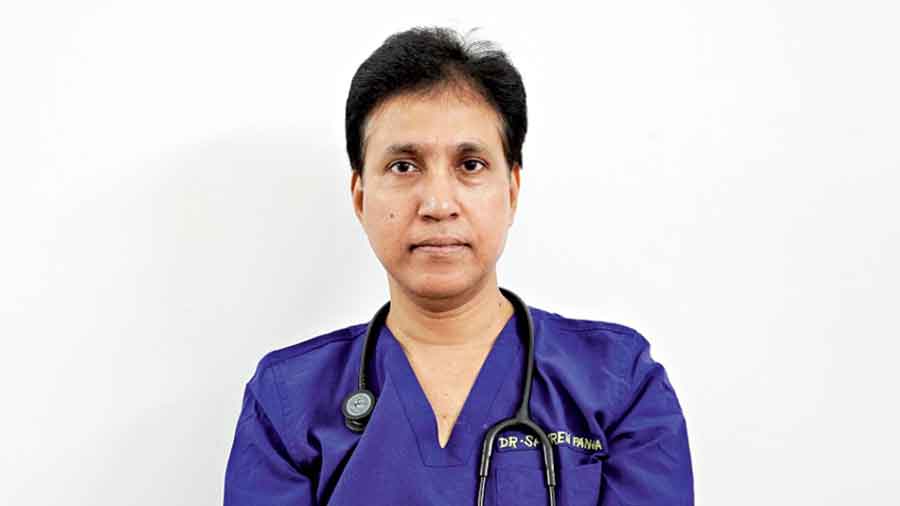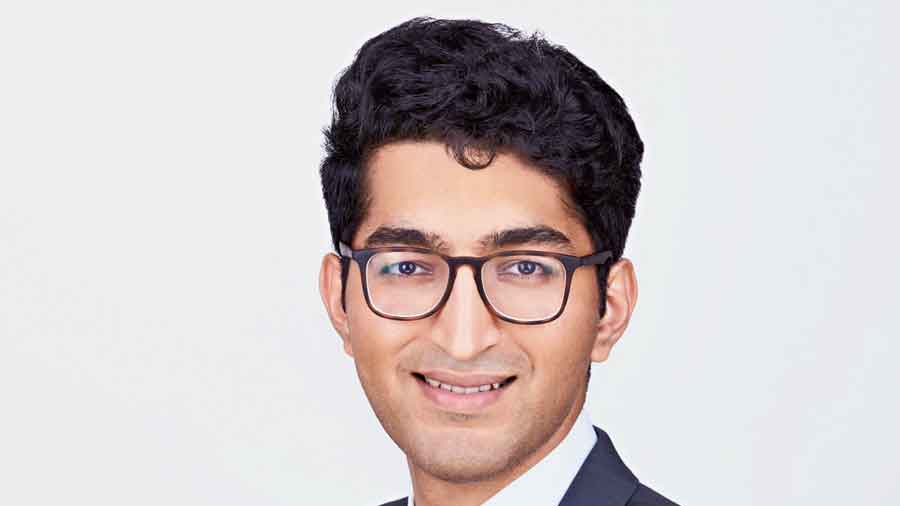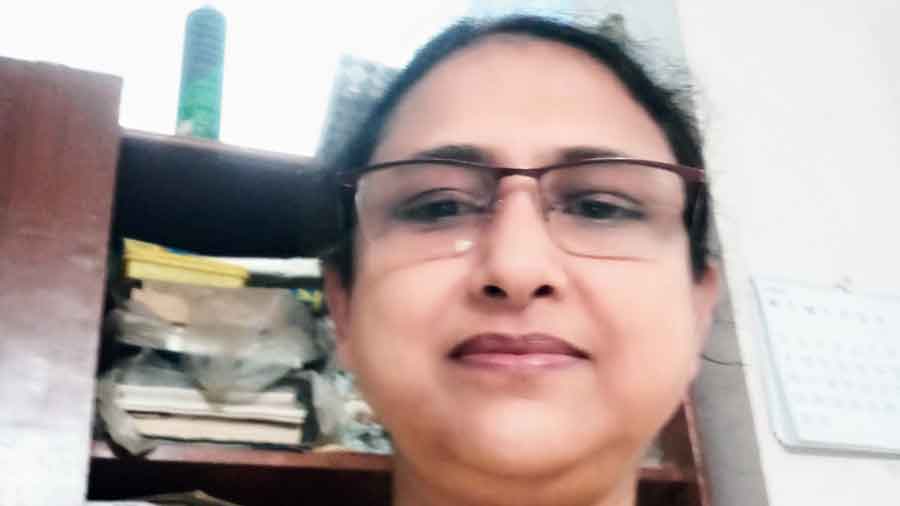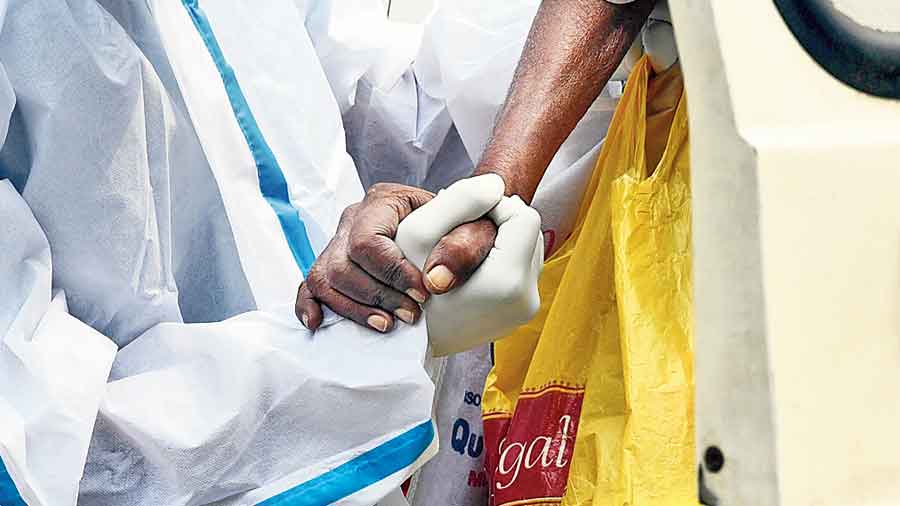Several patients admitted under them or in their wards dying in a single day. Spending long hours in ICUs treating a large number of patients fighting for life.
Living under constant fear of contracting the virus from their patients. Doctors treating Covid patients are reeling under stress and trauma like never before.
Initially, many of them hoped that the pandemic would eventually fade away but now they are convinced the virus is here to stay. They are now apprehensive about another surge in cases, which would mean another phase of physical and mental stress.
The author spoke to three doctors, two from Kolkata and one from the US, who have been treating Covid patients since the pandemic broke out in 2020.
They share their frustrations, grief and also the determination to fight on

Sauren Panja Telegraph picture
Lack of guideline adds to stress
Sauren Panja, 50, critical care specialist at RN Tagore International Institute of Cardiac Sciences
In my more than 20 years as a medical practitioner, I have never felt such a deep impact of one disease on my body and mind. So many critical patients are admitted under me and many of them die... I often cannot sleep at night because of the stress.
Before the pandemic started, I would have around 15 critical patients admitted under me. But since the outbreak of Covid, I had 25 to 30 very critical patients under me at the peak of the first and second waves. The fact that there still is no clear guideline about the treatment only adds to the stress and anxiety.
My working hours have gone up, like all doctors treating Covid, from 10 hours to almost 14 hours. Apart from that, there is also the realisation that I am always at the risk of getting infected. This makes my family vulnerable, too.
At my age, we usually think about cardiac and other lifestyle ailments. But I had never thought that I would be at risk while treating patients.
Several of my colleagues across the world have died, whom I had known for years. Whenever I discuss with my colleagues about the pandemic, we say how we could have died, too. However, I have told myself that I cannot run away from this because we doctors are the only ones who can fight this battle.

Abhishek Chakraborti Telegraph picture
I am too deep into it to quit
Abhishek Chakraborti, 29, pulmonary and critical care medicine fellow at Newark Beth Israel Medical Center, US
I, like most doctors, had initially thought that by the winter of 2020, Covid would be behind us. But now we have accepted that it is here to stay.
Now, the cases have started rising again. I have been dealing with the physical and mental pressure for the last one-and-a-half years. And now I am bracing for another phase.
I was into my second year of residency training when Covid struck. Then I was attached to a hospital in New York. Before Covid, I would spend around eight hours at the facility. But after Covid, I have been spending 12 to 14 hours a day in the ICU.
We doctors and nurses have to constantly go into isolation rooms to attend to patients. This is time consuming as we have to wear PPE suits and follow all protocols.
But apart from the physical fatigue, there was this mental stress and trauma that I never experienced before. Covid patients deteriorate rapidly and there is nothing one can do apart from providing supportive management. I saw many young patients, some of them my age, die in front of me.
Now that the cases have started rising again, what makes me most frustrated is that many people in the US are refusing to get vaccinated.
It is understandable in a country like India where there is a shortage of doses, that many people remain unvaccinated. But in the US, where there is no such shortage, people are still making it a point of not taking the vaccine as a matter of personal pride. We are seeing many young patients getting sick. They are not vaccinated.
Even after being infected, they are saying they would not take the vaccine after getting out of the hospital.
Personally, since I stay far away from Kolkata, Covid has stopped me from meeting my parents and family members for more than a year and a half because of the travel restrictions. I don’t know when I will meet them again and enjoy food cooked by my mother.
One thing I have realised is that despite the fatigue, I am too deep into it to quit.

Bhaswati Dasgupta Nath Telegraph picture
Never seen so many patients die
Bhaswati Dasgupta Nath, 45, physician at Peerless Hospital
In the 23 years of my career, I have seen many patients die. Initially, I used to get very emotional but slowly it became part of my life. I would feel bad, especially talking to family members of the dead.
But Covid is different. I have never seen so many young adults die at our hospital. We had young couples admitted and then either the husband or wife would die and the other would
recover.
What can be more tragic than this?
This happened during both the first and the second wave. One of the factors that makes a doctor helpless is that there is still no definitive treatment for Covid. There are many drugs on trial, some of which have effects on some patients while others don’t.
There is no curative treatment till date.
In the first wave, the number of deaths was more. We had many patients dying, some of whom were admitted under the team I am part of. One day, there would be several deaths in the Covid ward. We would discuss the deaths and criticalities with doctors of other teams and there was this sense of helplessness, grief and frustration.
At home, too, in the initial days, I would not meet my 12-year-old son for days because I was staying away from him on a separate floor in our house. My husband, a doctor in the critical care department of another hospital, would also stay isolated from our son. All for the safety of our son. And this was adding to the mental stress.
Covid has forced me to stay longer at the hospital than before. Add to that the mental stress.
We were hoping the cases would go down finally but we still have more than 20 patients on an average at our hospital on any given day. Then there is this prediction of another wave.
Amidst this gloom, I am keeping my fingers crossed. The fact that many people are recovering from Covid and going back home is giving me and many other doctors the will to fight on.
